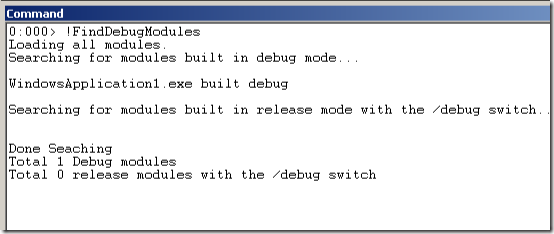ASP.NET Tips: Debugger command you may not know about – finddebugmodules
So there are a couple different things that can affect performance of your ASP.NET application. One of them is if you are running with debug builds of your files. This is where this command comes in. When run, it will tell you any modules that you have in your process that are built debug or built release with the /debug switch (to create pdb files).
The output looks like:
So from this you can see what files you need to rebuild. Remember that unless you are debugging in Visual Studio, you don’t need pdb files for .NET. So you can safely turn that switch off.
Comments
Anonymous
April 01, 2008
PingBack from http://blogs.msdn.com/tom/archive/2008/04/01/asp-net-tips-debugger-command-you-may-not-know-about-finddebugmodules.aspxAnonymous
April 21, 2008
I disagree ... greatly ... You still want to BUILD with pdbs in case you need to use them later (memory dumps etc) you just don't want to DEPLOY pdbs with your application.Anonymous
April 21, 2008
Greg, You bring up a good point. Which is what do you use pdb's for? With managed code, the only reason to have them is if you plan on debugging the application live with Visual Studio. If you are going to look at dumps and use Windbg and other debuggers like that, they don't use pdb's at all. So basically, if you build them, you are putting in the hooks into the dll which are not needed. And with a managed assembly, that actually takes up more memory and causes the files to be bloated. Not just the dll on your drive, but the compiled assembly in memory.Anonymous
June 18, 2008
These are not a new command in some regards as they were added to the 1.x version of SOS that ships with
